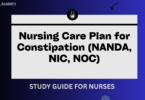Table of Contents
ToggleAssessment:
Objective Data:
- Evaluate the patient’s current knowledge level about their medical condition, treatment plan, and self-care measures.
- Assess the patient’s ability to comprehend written and verbal information related to their healthcare.
- Review medical records for any documented gaps in the patient’s understanding of prescribed medications, dietary restrictions, or follow-up care.
Subjective Data:
- Conduct a patient interview to identify areas where the patient feels uncertain or lacks information.
- Inquire about the patient’s preferred learning style, any challenges they face in understanding medical information, and their willingness to engage in education.
Diagnosis:
- Knowledge Deficit related to [Specify the specific aspect of care or medical condition].
Planning:
- The patient will demonstrate improved understanding and knowledge retention regarding their medical condition, treatment plan, and self-care within the next week.
Interventions:
- Assess Learning Style:
- Determine the patient’s preferred learning style (visual, auditory, kinesthetic) to tailor educational materials accordingly.
- Utilize multimedia resources, diagrams, or hands-on demonstrations as appropriate.
- Establish Learning Objectives:
- Collaborate with the patient to identify specific learning objectives, focusing on key areas of concern or importance.
- Break down complex information into manageable segments to facilitate understanding.
- Provide Written Materials:
- Offer written materials such as pamphlets, brochures, or customized handouts explaining the patient’s medical condition, treatment options, and self-care instructions.
- Use clear and simple language, avoiding medical jargon.
- Use Verbal Communication:
- Engage in open and transparent communication, allowing the patient to ask questions and express concerns.
- Encourage active participation by asking the patient to repeat information or summarize key points.
- Demonstrate Procedures:
- Demonstrate any necessary procedures, medication administration techniques, or self-care tasks.
- Observe the patient as they practice the demonstrated skills, providing feedback and correction as needed.
- Encourage Family Involvement:
- Involve family members or caregivers in the educational process to enhance the patient’s support system.
- Provide resources and information to family members to reinforce the patient’s learning at home.
- Utilize Technology:
- Introduce technology-based resources, such as educational videos, online tutorials, or mobile applications, to enhance learning.
- Ensure the patient has access to necessary technology and is comfortable using it.
- Schedule Follow-Up Sessions:
- Arrange regular follow-up sessions to review and reinforce information.
- Use these sessions to address any new questions, concerns, or changes in the patient’s condition.
Evaluation:
- Assess the patient’s ability to recall and apply information learned during educational sessions.
- Observe the patient’s adherence to prescribed treatment plans and self-care measures.
- Review any follow-up questions or concerns raised by the patient.
- Adjust the educational plan based on the patient’s progress and identified areas of continued knowledge deficit.
- Document the patient’s level of understanding and engagement in the educational process.
Read more: Nursing Care Plans
Read more: Risk for Infection Nursing Care Plan







